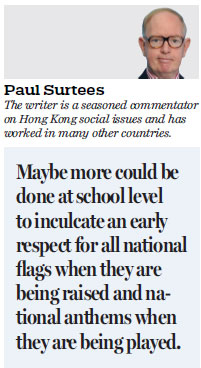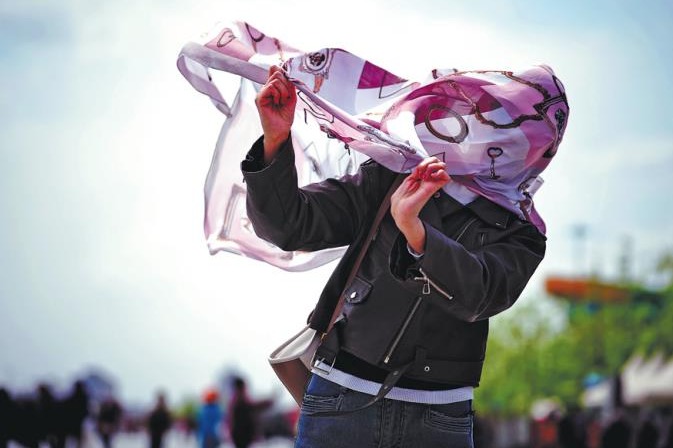Why we must respect all national symbols

Paul Surtees welcomes legislation to protect country's symbols as shows of disrespect become commonplace in HK and abroad
News that legislation will soon be introduced in Hong Kong to better protect the national anthem from abuse by protesters comes in the wake of growing disrespect being directed at national anthems, here and abroad. This is a move to be applauded because many countries already have such laws on their statute books. So Hong Kong is merely playing catch-up.
I was brought up in Britain where in the old days the national anthem was played before a film was shown in cinemas and various other places. It was then unthinkable for a British person to show any disrespect to the Union Jack or national anthem. But things have changed a lot since as we witnessed many instances of people refusing to stand, or even kneeling down, to make a political statement. It brings into question whether it is appropriate to denigrate such solemn national symbols to promote one's personal views on any controversial subject. It is no different from cutting off your nose to spite your face.
Contrast that to the exemplary situation in Thailand, which I recently revisited. There, twice a day, the national anthem is played in public places. The ever-gracious Thai people display every sign of respect for it, and it is very touching to observe this daily expression of heartfelt solemnity that marked such occasions as this is one daily routine all Thais share regardless of their personal differences on other matters.

The citizens of many more countries should try to emulate the seemly Thai people by adopting, or re-adopting, such displays of nationalistic spirit and patriotism. It is worth remembering that throughout history the flag was a national unifying force. In the heat of battle, soldiers have been known to risk death by racing to hold up a fallen flag as enemy bullets whiz around them.
In the United States, it has recently become common for protesters at sports events - including the players themselves - to express anger over certain political or human rights issues by kneeling throughout the pre-match playing of their national anthem. In most such cases, the public has never disputed their right to express displeasure, but not by channeling it to an unrelated important symbolic object.
Surely some other, more effective, ways can be found by such protesters to make their point? Who do they think their national anthem represents when they take such action? A national anthem represents all the people of a country; surely they are not venting their anger toward all their fellow Americans?
Sadly, we have seen here in Hong Kong comparable inappropriate public displays of misdirected rudeness. On more than one occasion, when the Chinese national anthem is being played before the commencement of a much-anticipated sports event, some in the audience from Hong Kong would cause a stir by making rude gestures with their hands and other uncivilized body language and sometimes sing along but use twisted language mimicking the anthem. Thus it is not surprising that the special administrative region government has seen it necessary to introduce legislation to penalize such actions.
A national anthem should have a deep resonance in the hearts of all a country's citizens. It represents them; meaning it represents their country's physical territory and fellow citizens. It should be given every respect: a respect that is expected and is seemly when coming from their own fellow nationals; and which is polite when coming from foreigners. I have attended scores of consulate or embassy national day celebrations here in Hong Kong and around the world. The national anthem of the host country is always played at these formal receptions, together with the anthem of the celebrating nation. Each is shown equal respect, as are both countries' flags, which is just as it should be.
Maybe more could be done at school level to inculcate an early respect for all national flags when they are being raised and national anthems when they are being played. It's been known throughout history that acts of disrespect for such national symbols can sometimes lead to serious incidents.
Perhaps we should all be guided by what someone once said about the American flag, because it also applies to our respective national flags: "Our flag honors those who have fought to protect it, and is a reminder of the sacrifice of our nation's founders and heroes..."
(HK Edition 10/26/2017 page9)






























